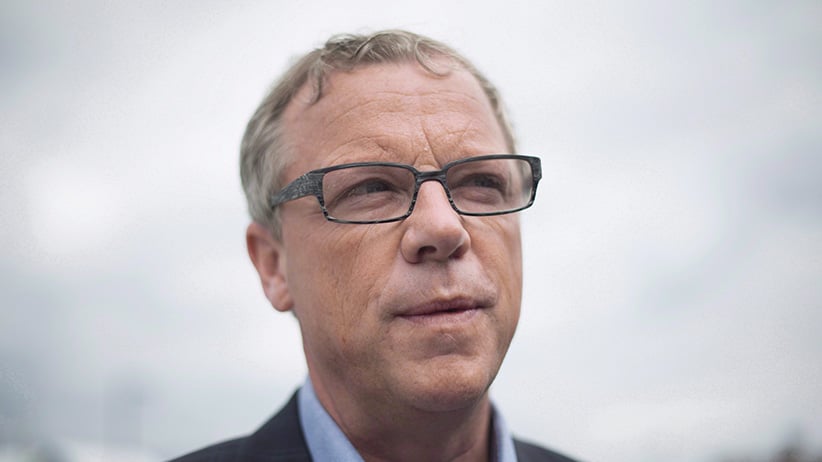How a revenue neutral carbon price can help Saskatchewan
Experts make the case that Brad Wall’s claim that putting a price on carbon will hurt Saskatchewan is wrong
Saskatchewan Premier Brad Wall arrives for a meeting of provincial premiers in Whitehorse, Yukon, Thursday, July 21, 2016. Wall, an outspoken critic of Liberal climate-change policy, lashed out Monday at Justin Trudeau for “unilaterally” imposing a carbon price on provinces and territories. THE CANADIAN PRESS/Jonathan Hayward
Share

Saskatchewan Premier Brad Wall argues that any form of carbon pricing, even a revenue neutral carbon tax, would hurt the competitiveness of his province’s economy. Instead, he wants to promote clean technology like carbon capture and storage that can reduce Saskatchewan’s greenhouse gas emissions and be exported to reduce emissions around the world.
Premier Wall is right to be concerned about what carbon pricing would mean for economic competitiveness—data from Canada’s EcoFiscal Commission show that up to 18 per cent of Saskatchewan’s economy falls under traditional definitions of emissions-intensive and trade-exposed sectors. These sectors are of great concern when implementing carbon pricing, since carbon prices can have large impacts on profitability and their activities are easily shifted elsewhere. He is also correct that technological innovation will be essential to solving our collective climate change mitigation challenge.
What Premier Wall misses is that neither of these represents an argument against carbon pricing. In fact, a well-designed carbon system can address competitiveness concerns while providing meaningful, market-based incentives for the development of new technology.
Competitiveness concerns can be addressed under a carbon pricing system. Quebec and Ontario’s cap-and-trade systems give large emitters free allowances to mitigate competitiveness concerns, as do similar programs in the EU and in California. Alberta’s new Carbon Competitiveness regulation uses output-based allocations (OBAs), giving producers free credits based on the emissions performance of the lowest-intensity facilities in each sector—to preserve overall competitiveness, while giving the best-performing facilities a greater advantage. These types of measures protect exporters from the competitive consequences of carbon pricing while still giving them an incentive to improve their emissions performance. There is no reason that Saskatchewan couldn’t design a carbon price system that protects its exporters as Quebec, Ontario and Alberta have done.
This echoes the views of companies around the world that see carbon pricing as the best way to reduce emissions while promoting economic growth. Companies like BHP Billiton, a major player in Saskatchewan’s potash industry, have joined the Carbon Pricing Leadership Coalition. As BHP’s website says, “we believe there should be a price on carbon, implemented in a way that addresses competitiveness concerns and achieves lowest-cost emissions reductions.”
Saskatchewan has made significant commitments to reduce emissions by developing carbon capture and storage technology and generating 50 per cent of its electricity from renewable sources by 2030. But these positive moves to clean energy will cost billions of dollars. Carbon pricing is the best way to make investments in clean power cost-competitive. With a carbon price in place, the market can decide between building more wind or solar power or carbon capture and storage technology, or other alternatives like hydroelectric or nuclear power. And the best way to create an international market for Saskatchewan’s expertise in carbon capture and storage would be a global carbon price so that countries like China, India, and Indonesia have an economic reason to buy Saskatchewan’s technology.
Premier Wall suggests that carbon taxes don’t work, noting that British Columbia’s emissions have risen since 2010, and suggests that direct support for new technologies is a better alternative. In fact, research shows that B.C.’s emissions have fallen relative to its economic and population growth, and relative to the rest of Canada. B.C.’s carbon tax has succeeded in reducing emissions by five to 15 per cent from what they would have otherwise been. Furthermore, recent research published by the C.D. Howe Institute has shown that carbon pricing is the most effective means to drive the types of clean energy innovation that Premier Wall has championed. It found that while “combining both R&D subsidies and carbon prices yields the largest economic benefit, a policy using only the carbon tax achieves 95 per cent of the benefits of the combined policy.”
While we can design carbon policy to protect trade-exposed industries from loss of competitiveness, we must also recognize that many of Saskatchewan’s competitors are facing carbon prices either directly or indirectly. Of course, Alberta and B.C. have carbon-pricing programs in place, and the U.S. is bringing in effective carbon pricing for electricity in the form of the Clean Power Plan. For example, Saskatchewan’s neighbouring state of North Dakota, which depends heavily on coal for electricity, will have to reduce its power emissions by 37.5 per cent by 2030 under the Clean Power Plan. This means an implicit carbon price of US$16 to US$32 per tonne according to the Electric Power Research Institute.
Premier Wall is right to be concerned about keeping Saskatchewan’s industries competitive, but this can be accomplished within the national goal of putting a price on carbon. A well-designed system could be in Saskatchewan’s interests. In fact, a recent study commissioned by Canadians for Clean Prosperity showed that if Canada as a whole adopted an Alberta-style carbon pricing system, and made it revenue neutral like B.C., Saskatchewan could be the biggest economic winner.
Instead of pushing back against cost-effective action on climate change, Brad Wall could bring in a carbon price that protects Saskatchewan’s industries, creates incentives for new technology and clean energy, and refunds every dollar of revenues to Saskatchewan households and businesses.
Andrew Leach is associate professor of natural resources, energy and environment at the University of Alberta’s school of business, and chaired Alberta’s Climate Leadership Panel in 2015; Mark Cameron is executive director of Canadians for Clean Prosperity, and Christopher Ragan is associate professor of economics at McGill University and chair of Canada’s Ecofiscal Commission.